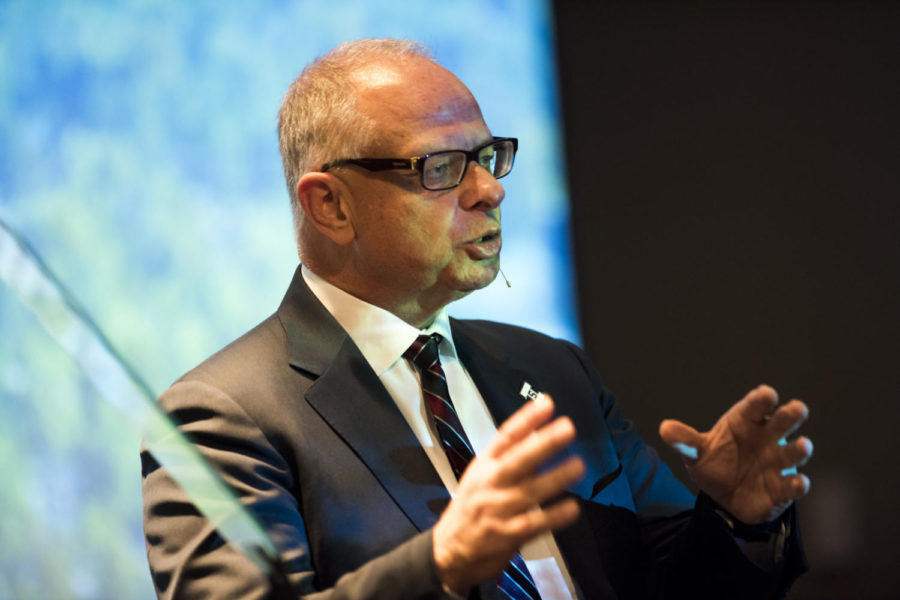Graduate students ‘concerned,’ ‘discouraged’ by Montemagno’s vision for SIU
Chancellor Carlo Montemagno speaks about his strawman plan for academic reorganization at the university Thursday, Oct. 19, 2017, at an open forum in the student center auditorium. (Dylan Nelson | @DylanNelson99)
November 15, 2017
As Chancellor Carlo Montemagno continues to release more details regarding his plan to rearrange academic programs, some graduate students say they are growing increasingly concerned about their future at SIU.
Particularly worrisome, students say, is his plan to eliminate graduate student instructors of record — graduate students who teach undergraduate classes.
According to Montemagno’s Vision 2025 website, graduate students will not serve as instructors of record who have the “independent responsibility for creating and delivering courses, including making determinations about which students may enroll in the course, what instructional materials are used, and what grade the students will receive.”
Advertisement
Bethany Henning, a graduate student instructor of record, said this is “discouraging,” and could be detrimental to her career prospects when she graduates.
“It is really difficult to teach knowing that I do not have the support and confidence of this administration and our chancellor, knowing that he thinks that I am not qualified to be an instructor of record,” Henning said.
Being an instructor of record, Henning said, makes her more competitive with other graduates from other universities for jobs in her field.
“My experiences in the classroom both as a student and a teacher have been so valuable to me as a person and as a learner,” Henning said. “I am pretty sure that Montemagno doesn’t know this yet, but … it is the thing that allows me to compete with Ivy League graduates at this stage.”
Henning said she has been a teaching assistant numerous times and an instructor of record six different times, all of which have been experiences that have prepared her for a career.
“A lot of people, when they graduate with their Ph.D., cannot say that — but I can,” Henning said. “SIU is special. Montemagno is trying to make it less special in that way.”
Associate Provost David DiLalla said the elimination of graduate instructors of record is not due to the chancellor’s academic reorganization plans.
Advertisement*
“[It is due to ] the need to ensure that all of our undergraduate students receive the best education possible and that our graduate students who are involved in classroom instruction have strong mentorship and supervision,” DiLalla said. “We recognize the importance of teaching experience for the professional development of graduate students and we will be encouraging program leaders and faculty to develop innovative mentored teaching opportunities that provide this extremely valuable experience to our graduate students.”
Dianah McGreehan, the Graduate and Professional Student Council vice president for administrative affairs, said she is concerned the decision to eliminate graduate instructors of record was not made based on any evidence.
She said she recently met with a high-level administrator, whom she preferred not to name, to ask what the reasoning for the decision was.
“[The administrator] responded that it was pretty much just off of the chancellor’s sole philosophy,” McGreehan said. “The sole philosophy of one man, rather than data and research and evidence — which is surprising since he’s such a man of science and empirical data.”
In McGreehan’s department, communications studies, she said there are 47 courses taught with graduate students as instructors of record.
“Now to eliminate that would just be madness,” McGreehan said.
Henning said graduate student instructors of record are not free to do whatever they wish with a course syllabus, but rather must submit it to faculty members for approval before it can be used.
Submitted syllabi go through a review process, she said. The department looks it over to collectively decide whether the graduate student is ready to teach the courses they applied to, and Henning said revisions are typically made before the student can teach the class.
“I don’t think Montemagno understands the process by which I’ve been shepherded and supported and crafted into a teacher with my own style and my own approach,” Henning said. “My syllabi go through a rigorous process of competition and analysis before they’re approved.”
McGreehan said part of the administration’s rationale is that prospective students don’t want to be taught by teaching assistants — they want to be taught by faculty members. But if graduate students are still teaching core classes, albeit supervised, she said it still doesn’t make sense from a marketing standpoint.
“The goal was to promote to incoming students that all their classes would be taught by faculty members,” she said. “That is the promotion of a blatant falsehood, because nothing is going to change… When you’re registering for those classes, I can promise you that instructor will never set foot in the room.”
In an opinion piece published in the Southern Illinoisan on Thursday, Montemagno said SIU must “pay attention to graduate education, providing our graduate students opportunities to engage with our academic mission through assistantships, including teaching assistantships.”
“We can grow our graduate enrollment overall with increased grant funding that provides opportunities for graduate students,” the chancellor said. But we must rely on multiple sources of funding to ensure that these opportunities are in all of our graduate-level programs.”
Clay Awsumb, GPSC vice president of graduate school affairs, said this aspect of the chancellor’s plan for SIU is hard to disagree with.
“The idea of putting a priority on the quality of one’s graduate and professional training and education that they receive, that’s not something anyone is really not interested in doing,” Awsumb said.
Still, Awsumb said graduate students feel a bit in the dark about the chancellor’s plans for them.
“A lot of what we’ve been trying to do is piece together what we can in sort of that limited articulation of any kind of vision, or plan or sense of direction for graduate studies,” Awsumb said.
DiLalla said the chancellor is still shaping his vision for graduate students based on the feedback he is constantly receiving.
“I am confident that feedback and input from graduate students was seriously taken into consideration, and that such feedback influenced ongoing development of the proposal,” DiLalla said.
Graduate programs weren’t explicitly addressed in the initial reorganization plan because the chancellor was trying to keep it from becoming complicated, DiLalla said.
“We did not list all degree programs for simplicity of presentation. We also did not include graduate certificate programs on the draft version of the chart, again for simplicity of presentation,” DiLalla said.
When the next draft of the reorganization is released Nov. 17, DiLalla said the administration will provide a summary of where every academic program, including minors and certificate proposals, will be housed.
According to Montemagno’s Vision 2025 website, his goal is to “increase graduate enrollment and opportunities by fostering an environment for faculty to build interdisciplinary graduate programs that will attract students as well as grants and other external funding to support them.”
McGreehan said that, according to operating papers released over the summer by SIU President Randy Dunn when he was acting as interim chancellor, the university’s projected total operating budget for this year is around $180 million.
Compared with the entire budget, McGreehan said the amount of money saved by the reorganization is inconsequential.
“This entire restructuring that the chancellor is proposing would only potentially save $2.3 million,” McGreehan said.
GPSC President Johnathan Flowers said the chancellor seems unwilling to communicate with graduate students which, among other things, contributes to their uncertainty.
“The chancellor’s silence, the constant revision of his messages where GA funding is concerned, the apparent unwillingness to communicate with GPSC — all of this makes me very concerned with regards to the future of graduate education at this institution,” Flowers said.
McGreehan said GPSC has asked the chancellor several times to hold an open forum for students.
“[We asked] especially on behalf of GPSC so that he can answer some of these questions directly towards graduate students, and it has been denied to us,” McGreehan said.
Staff writer Kitt Fresa can be reached at kfresa@dailyegyptian.com or on Twitter @kittfresa.
To stay up to date with all your southern Illinois news, follow the Daily Egyptian on Facebook and Twitter.
Advertisement










Bradley Skelcher • Nov 15, 2017 at 10:47 am
I think eliminating graduate students from teaching is misguided. I just wonder where he came up this such an idea. I taught as a graduate student at SIUC. It allows us to develop our teaching skills, provide a necessary and cheap service to the University, and makes us more competitive in the job market upon graduation. Also, we are very knowledgeable and know our content probably as much as most given the rigors of our training. Please do not go forward with such a wrongheaded idea.